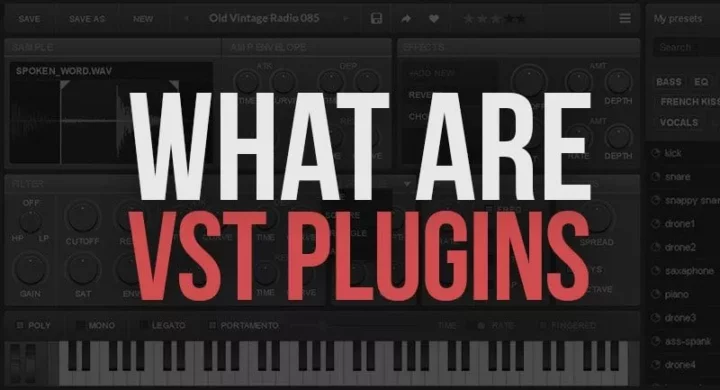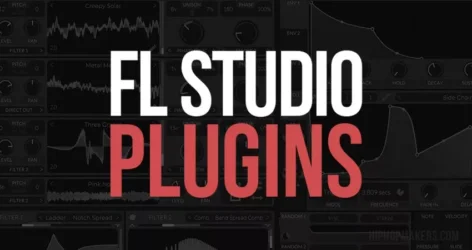This article will answer what is a VST Plugin, what they do, and how to use them. We also provide tips for downloading and installing VST plugins.
What Is A VST Plugin?
VST stands for Virtual Studio Technology. VST Plugins are installable plugins that add virtual instruments to music software. These can be a synth plugin, piano, guitar, etc. Audio effect VST plugins can add effects like Reverb or Echo. Installing VST plugins gives you unlimited instruments and effects.
Explore our articles on the best free VST plugins and VST instruments to find the perfect sounds for your music projects.
- What Is A VST Plugin
- Why Use VST Plugins
- What Programs Use VST Plugins
- How Do You Use VST Plugins
- Where Do I Download VST Plugins
- What Is A VST Plugin Folder
- Free VST Plugins vs. Paid VST Plugins
- What Is A VST Host
- Are VST Plugins Safe
- Are VST Plugins Free

What Is A VST Plugin?
To understand VST plugins, it is first essential to know what a plugin is.
A plugin is a type of software that works in another piece of software, and it is a piece of software designed to function in conjunction with a sequencer or a DAW and provide the extra features and sounds that don’t come with the original DAW software.
So, a VST plugin is a piece of digital software that enables us to use audio effects and virtual instruments in a DAW (also known as a Digital Audio Workstation).
It processes audio or MIDI as it is played in a DAW. It is either used to add some audio effects to it or make the MIDI notes sound, so they are played through a musical instrument.
They are designed so that VST plugins work within the DAW applications, which can be used to make music in the home studio or a professional studio setting.
Although VST instruments are generally designed for use with DAW applications, remember that different VST plugins can have other purposes.
VST plugins can work on Windows, Mac, and Linux computers.
Here are some of the types of VST plugins:
#1. VST Instrument Plugins
These types of plugins generate audio that emulates Piano, Bass guitar, and many other real-world instruments. They are also known as VSTi plugins.
These plugins can emulate different instruments within Digital Audio Workstations. This is a cost-effective way because you can simulate any musical instrument just by using a VSTi without purchasing those instruments.
Examples of VST Instrument Plugins
#2. VST Effects Plugin
VST Effects add effects to the audio, and they take the audio and modify it in different ways, which is great for an audio engineer. This involves digital signal processing.
The VSTi plugins create the audio, but the VST effects plugins alter the audio.
Just like the VSTi plugins are designed to sound similar to the real instruments, in a similar way, VST effects plugins are also designed based on the real, physical effects hardware.
DAWs generally come with built-in audio effects, but VST effect plugins help take it to another level.
Some of the effects that can be applied using VST audio plugins are as follows:
- Reverb Plugins
- Chorus
- Compressors
- EQ Plugins
- Delay Plugins
- Saturation plugins like a saturation knob.
See Related: 50 Best Free VST Effects Plugins
#3. VST MIDI Effects
These plugins mainly work with MIDI data either independently or with other VST plugins. They are designed in such a way that they can process the MIDI data on their own or modify it and pass it to the other plugins as well.
The VST MIDI plugin can perform tasks like transposing or arpeggiation. Although MIDI is a powerful tool, it can also sound artificial sometimes.
But if you use the right VST plugin, you can make the MIDI input sound more natural.
Why Use VST Plugins?
You can use VST plugins to add more sounds to your music-making software, and there are hundreds of free and paid VST plugins available online.
VST plugins have made the process of creating music much simpler. Previously in the past, hardware and instruments were required, which were virtually not accessible, for especially new musicians, because of the cost implication. But VSTs are quite cost-effective.
Here are some of the reasons why VST plugins are useful:
- They come with presets, which are nothing but built-in sounds that the manufacturer itself programmed. Due to them, the user now doesn’t have to create the sound from scratch.
- You don’t need to purchase high-end and costly instruments because you can get almost the same sound with the VST plugin. VST plugins generally come with different instrument sounds already loaded. So the user can download and install the specific instruments with more detailed sound libraries.
- It is very easy to access VST plugins and start working on projects fast. Using VST plugins, you can save a lot of time as they are easily accessible.
- Even if you aren’t an expert in doing a certain task while recording or producing the music, we can take the help of the VST plugins.
- You can control the VSTi plugins using the external MIDI controllers. Whether your VST plugin is free or paid, you can use your MIDI controller with almost any VST plugin that exists. Using VST with your MIDI controller, you can also save a lot of money because you would basically only need one piece of hardware compared to numerous pieces.
What Programs Use VST Plugins?
Most popular DAWs and music software programs support VST plugins. Although some VSTs can operate by themselves, VST plugins are meant to be used with Digital Audio Workstations.
So to use a VST plugin, you should download the DAW of your choice.
You may like to check out these related articles:
How Do You Use VST Plugins?
To use a VST plugin, you have to download and install it in your favorite music software.
Check out our guide on How to Install VST Plugins on Windows, Mac, and FL Studio.
Where Do I Download VST Plugins?
I have a dedicated category of articles on our blog from where you can download around 400+ free VST plugins and free VST instruments. We highly recommend you check that out for more information.
What Is A VST Plugin Folder?
The VST plugin folder is the location where you need to add new VST plugin files so your music program can find them.
Here is the typical process for adding new plugins to your computer:
- Download the VST plugin to your computer. Unzip the file if needed.
- Add the unzipped VST plugin files, the .DLL file to your VST plugin folder.
- Rescan the VST plugin folder in your music program to find the new plugin.
Then you should be able to use the new VST plugin if your music program supports the plugin.
The VST plugin folder will be different for different people depending on the program and operating system.
Here are the typical VST plugin folder locations:
Windows ( .dll )
- C:/Program Files/Steinberg/VstPlugins/
- C:/Program Files/VSTPlugins/
- C:/Program Files/Common Files/VST2
- C:/Program Files/Common Files/Steinberg/Shared Components/
- C:/Program Files/Common Files/VSTPlugins/
Mac OS ( .vst )
- /Library/Audio/Plug-Ins/VST/
- ~/Library/Audio/Plug-ins/VST/
The plugin location may vary depending on the plugin format. Most VST plugins online were created to work with Windows, but not all VST plugins will work with Mac.
Free VST Plugins vs. Paid VST Plugins?
There are pros and cons to both free and paid VST plugins. Free plugins can be buggy, provide limited sounds, have fewer features, and may not work with all music programs and operating systems. And many paid plugins can be costly and may not provide as many features and sounds as some freeware plugins.
When you are considering buying a VST plugin, you may want to search if there are any free alternatives with similar sounds and features.
If you do not have the time or patience to figure out how to make plugins work with your music setup, then buying a VST plugin from a trusted source may be best.
Some trusted popular brands for paid plugins are XLN Audio, Native Instruments ( Komplete Start ), Plugin Boutique, Spitfire Audio, and Plugin Alliance.
Many free VST plugins offer the same quality and features as paid plugins. So free plugins vs. paid plugins will depend on your setup, needs, and time availability.
What Is A VST Host?
A VST host is the host software application or hardware device under which a VST plugin runs. It provides a VST Plugin interface to edit VST plugin settings and get access to the sound libraries. These interfaces are essential for tweaking the settings, changing audio presets, and customizing sound.
Recommended: 20 Free VST Host Applications
Can I Use A VST Without A DAW?
Yes, you can use a VST plugin without a digital audio workstation.
Some VST plugins come as standalone applications that can run independently of music software.
An alternative option to using a DAW is using a VST host application and software. A VST host will allow you to load and play VST plugins like a standalone application.
Do VSTs Work on Both Mac & PC?
Yes, VST plugins work for both Windows and Mac computers. But Windows has a much more comprehensive selection of free VST plugins available for free download. But hundreds of free plugins are still available for Mac (Audio Units /AAX Formats).
If a free plugin is only available on a PC, you may find a similar option for Mac. If you can not find an alternative, you can use the Windows plugins by running the Boot Camp software on your Mac.
Are VST Plugins Safe?
Yes, VST plugins are safe to install, but you want to make sure you download from trustworthy websites.
If you are unsure if a website is safe, search Google for the website name and look for reviews, comments, and online forms about the website.
Fortunately, most VST plugins available on both the paid and free markets have been designed by reputable companies.
What Is the Difference Between a Plugin & VST?
Plugins are software that can add extra abilities or features to your Digital Audio Workstation (DAW).
VST and VST3 are the most common plugin formats, but Apple’s AU ( Audio Unit ) and Pro Tools AAX are also considered plugins.
Though they all exist as plugins, only VSTs will be referred to as such since it is the standard for the term.
How Do You Use VST Plugins?
Using VST plugins is pretty straightforward. Once installed on your computer, they will appear in your DAW’s plugin list.
Select the plugin you want to use and add it to your project as an instrument track or an audio effect track, depending on which type of plugin it is.
You can then adjust the plugin’s parameters using its user interface, just like any other instrument or effect in your project.
Tutorial: How to Install VST Plugins
How Can Free VST Plugins Help You?
Free VST plugins can be beneficial when it comes to creating great-sounding music. With the right plugin, you can add thousands of new virtual instruments and sound effects to your existing setup – all without breaking the bank.
These plugins often come with a customizable user interface and settings that allow you to tweak the parameters of VST instruments and VST effects to get the right sound.
And because many of these plugins are open source, they’re constantly being updated and improved over time – so you always have access to the latest version!
What Programs Use VST Plugins?
The most popular and widely used digital audio workstations support VST plugins, including FL Studio, Ableton Live, Garageband, Steinberg’s Nuendo, Pro Tools, Reaper, Logic Pro, Sony Acid Pro, and many more. With a host of options to choose from, today’s music makers can take full advantage of all the tools these VST plugins provide.
What Can You Use VST Plugins For?
VST plugins are some of the most powerful tools available to musicians and producers today.
With a VST plugin ( Virtual Studio Technology ), you can access hundreds of professional-grade audio effects and virtual instruments that will give your music projects more depth and complexity.
Whether you’re playing live shows, recording audio in a music studio, or producing tracks in the comfort of your own home, VST plugins are helpful for any music creator.
From synthesizers emitting otherworldly sounds to specific engineering tools for adding unique nuances to recordings, VST plugins give creators the power to create better music.
Are VST Plugins Free?
Yes, you can download hundreds of free VST plugins online for Windows, Mac, and Linux. You can find a VST plugin for musical instruments turned into virtual instruments. You will find free synths, guitars, pianos, and drums are very popular as free VSTs.
Does FL Studio Use VSTs?
Yes, FL Studio supports a variety of VST formats. Windows computers support 32 / 64 bit, VST 1,2,3, and Imagine-Lines’ own FL Studio Format. For macOS, they support 64-bit, VST 1,2,3, Audio Units ( AU ), and Imagine-Lines’ own FL Studio Format.
Summary of What Are VST Plugins
VST stands for Virtual Studio Technology. This is an audio plugin software interface that helps connect audio synthesizers and effect plug-ins to audio editors and hard-disk recording systems. It is used by music and recording professionals to enhance their audio projects.
In conclusion, virtual studio technology instruments, or VST plugins, are an essential tool for any music producer or audio engineer.
They allow users to create audio recordings, mix and master tracks, and add different types of effects to their music.
With many different types of VST plugins available, including virtual instruments, software synthesizers, MIDI effects, and more, there is no limit to what can be achieved with multiple VST plugins in a project.
While there are many paid VST plugins available, there are also many free VSTs that offer high-quality sounds and features.
Using free VSTs can save money while still achieving professional-sounding results. However, some paid VST plugins are considered the best VST plugins on the market, and investing in them can be worth it in the long run.
Most DAWs support the VST format, allowing users to easily install VST plugins into their projects.
Additionally, connecting a MIDI keyboard to a VST can allow for even more creativity and control. Many producers use multiple VST plugins in a single project, adding multiple effects and sounds to their audio tracks.
While there are many different types of VST plugins available, finding the right VST plugin for your needs can be easy with a little research.
Using VST plugins in your music production workflow can save time and offer endless possibilities for creating unique and professional-sounding tracks.
Whether you are new to music production or an experienced audio engineer, VST plugins are a must-have tool for anyone looking to take their music to the next level.
I hope you found this information on VSTs helpful.




